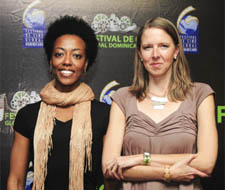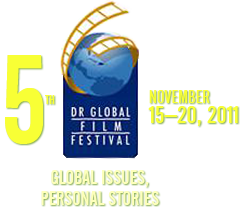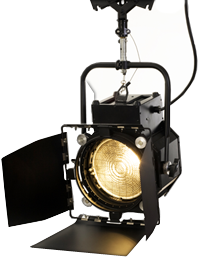

Forty Four Films Selected to Compete in the 3rd Short Film Competition
Santo Domingo, September 23, 2011Hundreds of Volunteers in Santiago, Higüey, Nagua and Puerto Plata Sign Up for the 5th Dominican Republic Global Film Festival
Santo Domingo, September 23, 2011Dominican Republic Global Film Festival Meets with more than 120 Aspiring Volunteers in Preparation for its 5th Edition
Santo Domingo, September 6, 2011The Dominican Republic Global Film Festival Invites Volunteers to Join the Fifth Edition of the Year´s Film Event
Santo Domingo, August 15, 2011Directors of the Dominican Republic Global Film Festival Attend the Los Angeles Latino International Film Festival (LALIFF)
Los Angeles, July 25, 2011Dominican Republic Global Film Festival Opens Call for Entries for Third Short Film Competition
Santo Domingo July 11, 2011“El Retrato de un Santo” Wins the First Short Film Contest Sponsored by Indomina’s ‘Dominicans Have Talent’
Santo Domingo, June 30, 2010Filmmakers Thank President Fernandez for the Film Industry Promotion Law at a Meeting in the Juan Bosch Library
Santo Domingo, June 14, 2011Dulce García Pereyra and Anapaula Gómez González Win Opportunity to Participate at Cannes Young Marketers Competition
Santo Domingo May 18, 2011
“Traces of the Trade: A Story from the Deep North” Personal Story of
Discovery, History and How one Family Faces the Sins of their Ancestors
Santo Domingo, November 20, 2010

When Katrina Browne learns that her ancestors in the United States were the biggest slave traders in US history, she decided to tell that story by following the so-called Triangle Trade, the route that operated from the late 16th to early 19th centuries, carrying slaves, cash crops and manufactured goods between West Africa, the Caribbean or the American colonies.
 In her research, Katrina learns that her family, the De Wolfs, owned 47
ships and had transported more than 10,000 Africans into New World slavery. That
represented about 60 percent of all slave voyages from her ancestral home of
Bristol, Rhode Island.
In her research, Katrina learns that her family, the De Wolfs, owned 47
ships and had transported more than 10,000 Africans into New World slavery. That
represented about 60 percent of all slave voyages from her ancestral home of
Bristol, Rhode Island.
When the US government, under Thomas Jefferson, outlawed the practice in 1808, the De Wolfs continued shipping slaves from Africa to Cuba. After all, business was booming and the family had become extremely wealthy. In 1812, the De Wolfs owned more ships than the US Navy. By the end of his life, James De Wolf had held the post of Senator and was the second richest man in the United States.
In the film, Katrina and her nine relatives (from siblings to distant cousins) take a life-changing journey as they trace their ancestor’s steps from Bristol to the slave forts on the coast of Ghana to the De Wolf family plantation in Cuba.
“It made me look at the amazing, total sense of privilege I was raised to expect,” said Ms. Browne who, along with her producer Juanita Brown, attended the 4th Dominican Republic Global Film Festival. Speaking at the crowded opening night reception, Katrina told this reporter that her attitude toward African Americans “has changed forever.”
She said the trip to Africa and Cuba and back presented her family with issues that many had never confronted up to that point in their lives. Questions were raised and at moments resentments surfaced, said Katrina. They faced questions such as: who, if anyone, should offer material and spiritual reparations to descendents of slaves?
“Traces of the Trade,” like another important documentary at the DR Global Film Festival, tackles the emotional question about how to deal with the sins of our fathers, sins of our past, sins of our country.
Katrina, who devoted nine years to the research and making of “Traces of the Trade,” said making it was liberating, healing and difficult at times.
The film showed at the National Cinemateque on Friday but for those who missed their chance, “Traces of the Trade” will be showing again on Wednesday, November 23 at 9 pm at Santo Domingo’s the Blue Mall Cinema.



